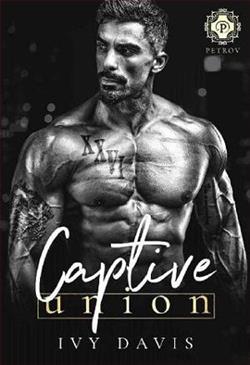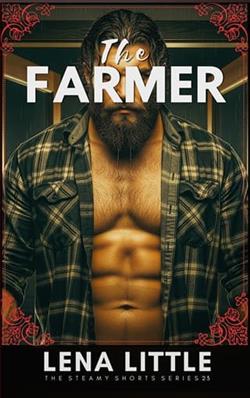Page 35 of The Trials of Alaric
A fortnight ago, he would have said firmly that it was the land, and all the many skills and activities to do with getting the best from the land. Now, Bea Collister had moved to first place in his scheme of things. He wasn’t going to say that to a complete stranger, though.
“I have recently arrived at the Isle of Claddach,” he told her. “I was in Brazil learning how to be a diplomat, but I wasn’t very good of it.”
“Isn’t diplomacy about charming people?” she asked. “You seem charming to me.”
“Ah, but you are excellent company,” he replied. “Tell me more about Claddach. You live on the other side of the island, I believe.”
They conversed amiably until Lady Claddach stood to signal the end of the meal, and Lord Claddach stood too. “Dear guests,” he announced, “we gentlemen shall not take our port here at the table tonight but shall accompany you ladies to the ballroom. I, and I might add, my wife and my daughter, expect every gentleman to do his duty. And, you will be pleased to know, port shall be served in the ballroom. Onward, ladies and gentlemen.”
It was a pleasant evening, Alaric mused as he readied himself for bed, much, much later. He would have preferred to have been less tired when it began, but he thought he had acquitted himself well enough.
His experience in the diplomatic service had included dancing with every available wallflower and flirting with every elderly matron. He had practiced both skills tonight, until his feet were sore, and his face hurt from so much smiling. But he had been rewarded. Bea had granted him a dance and had gone in with him to supper—for which he had been well and truly ready after several hours of dancing.
And tomorrow morning—this morning, rather, for it was hours after midnight—she was meeting him in the garden toshow him the statue of Narcissus. During supper, she had whispered his instructions for the morning. He was to meet her just outside the inner gatehouse, early, once the sun was above the horizon, but no later. He hoped the statue was in a private place. He would love to steal another kiss. While keeping a tight rein on his appetites, he ordered himself, sternly.
*
Bea walked throughthe garden with Alaric in the early morning light. Long ago, whenCashtal Vaaichhad been the refuge for the whole island, what was now garden had been kept bare of everything except blades of grass. Any invader who made his way past the outer wall would find himself exposed to every archer and spear thrower on the walls above.
Cashtal Vaaishin those days had earned its name—Castle Death—for it had been death to approach it with hostile intent.
Vikings, Irish, Scots, Welsh—all had tried their luck, not once but many times. The Lords of Claddach and their warriors sat in their high castle, and in the hill fort that preceded it. They left the invaders alone, until one of the notorious storms of the Irish Sea swept through. Then, under cover of the rain and wind, the men of Claddach would attack and win back their land. Any who lived would be given a choice. Swear fealty to Claddach or die.
Only two men had ever taken the island, and both by marriage to the only child of the Lord of Claddach. The first had been a Norman knight, Turstin Fitz Waundrile. He had persuaded his wife to swear fealty to William II of England in return for being named countess, with her sons to be earls after her. From that day on, any invader risked facing English might, as well as Claddach’s own men and the temperamental weather.
The second was Jamie McAllister, who’d married the second Lady of Claddach in the fifteenth century. His surname,anglicized to Collister, remained the family name today. If Bea became Lady of Claddach, she would be the third countess in the seven-and-a-bit centuries since the first.
“The gardens were laid out in the seventeenth century,” Bea told Alaric, “after the restoration. There were gardens in Stuart times, but they were ripped up and the trees chopped down when the thirteenth earl feared invasion during the civil war. During the wars with Napoleon, we had plans to strip the grounds again. I am glad they were not needed.”
“I am, too,” Alaric agreed. “Your gardens are lovely.”
“Papa and some of the earls before him brought back statues from Greece and Rome after their grand tours. It is one of those we are going to see.” They were making their way around the castle. The path wound through trees on the edge of a sunken garden that bordered the inner wall. And here were the steps that led down into the garden.
“Was this the moat?” Alaric asked.
“A dry moat. My nurse said bears were kept in it, or sometimes, she said, wolves. Papa said it was more likely to be guard dogs.”
“A pack of hungry guard dogs would do a good job, I imagine, if anyone made it up the hill this far.”
“We investigated flooding it,” Bea told him. “If the French invaded. The spring further up the hill, on the other side of the castle, would fill it in a couple of days, Papa calculated. But the head gardener said the ground drains too freely, which is why it is not a pond instead of a garden.”
She turned a corner into the little garden within a garden she was looking for. “In spring, this garden is full of narcissus. The flower, that is. But I think that is what you are looking for.”
She pointed. The statue was of a naked man. He was leaning over to peer into a pool, with a knee on the pool’s wall, and the opposite foot on the semi-circle of paving that bordered the wall.The pool was against the outer side of the dry moat, and water trickled down through ferns, lichens, and mosses to fall into the pool, but the disturbance was all on one side. Directly beneath the statue’s marble gaze, the water was still.
The garden was still in shadow, since the sun was not high enough to shine its rays into this declivity, but in broad daylight, Narcissus would be reflected against the background of the sky. “Echo is peeping around the rock at the back of the fountain,” Bea told Alaric. “There. See?” The rocky backdrop to the pool was even darker than that pool itself, but she could just pick out the shape of the poor nymph who wasted away to just her voice, yearning for the man who could not look away from his own reflection to discover she existed.
“How on earth,” Alaric asked, “did your father expect us to find this statue hidden away here in the dry moat? Or have we got the wrong answer? No, this is it. It all fits, Bea. The trap of beauty’s snare. Love can kill. That might be a number of stories. But still waters?”
Bea considered his question. “He did not object to me helping you,” she pointed out. “Perhaps one of the tests is whether you gentlemen ask for help. I will say, before you ask, that you are the only one to ask me, but any Claddach servant—indeed, any number of Claddach’s people—will know the artworks as well as, or even better than, me.”
“I believe it,” Alaric agreed. “I’d swear the island folk were taking notes all day yesterday. During the steeplechase, too. Do you remember that your father arranged for us to come across a distressed woman and her cart?”
“Yes, and disqualified those who ignored her,” Bea commented. They shared a look of understanding. It seemed to Bea that Alaric leaned closer to her as if perhaps to kiss her but then he took a step back and looked down at the moat.
“I shall go to your father and name Narcissus as the answer to the third clue,” Alaric said. “Have you noticed that so far, they are all love stories, of different types? Unhappy ones. I hope that is not your father’s message!”
“We shall have to see where the other clues lead us,” Bea told him. He looked at her again and he seemed to struggle with himself before he stepped close once more.















